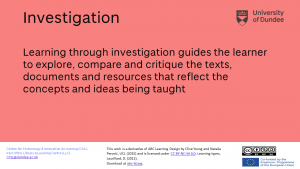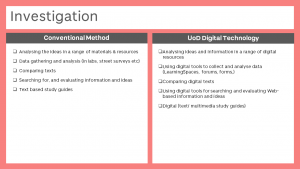Introduction
Investigation is a large part of student work – and in the earlier years is often seen as preparation for the final dissertation. As with all the learning types that we’re looking at, it isn’t distinct, and you may well have aspects of the investigation that overlap with collaboration or production learning types. We’ll try, however, today, to think about the investigative stages.
Investigation also includes inquiry-based learning and problem-based learning and typically involves students developing their own lines of narrative as they investigate, analyse and review their ideas and thinking. Students can make use of resources that cover both physical and digital formats including, books, video and audio recordings, pictures, animations, illustrations, databanks, libraries and collections. This approach helps students to become active participants in their learning as they critically think and evaluate data and information and discuss and explore concepts that are relevant to the real world and to the development of their disciplinary practise


Moving Online
As we start to think about moving investigation type learning online to help avoid “digital overload” it can be better to use My Dundee as the starting point, but to then get the students to move away from it and signpost them either to other tools, or, ideally, something they can do offline.
Existing Online resources, tools and simulations.
You may well have existing tools or datasets that you will be asking students to use,, so remember to include clear instructions for the students. This is particularly important if students have to have use specific platforms to access them, as we need to ensure that all students have equal access. To get some collaboration, perhaps get different groups of students to explore different tools or data sets, then share their findings with others.
We know that many of you are currently researching resources from external publishers that have digital simulations and models etc., particularly those in the Science, Engineering, Medical or other similar fields.
Gathering data
There are many open datasets online, which may give additional sources of data, especially if it’s not possible for students to gather their data personally.
We also have tools such as Microsoft Forms that could be used by students to start to gather data, with appropriate support for the ethical and GDPR issues of data collection.
Web searching.
One key issue that you’ve probably found is that students don’t always find it easy to search effectively, but they don’t always recognise that. This can be difficult, as it’s difficult to teach people things they think already know.
It may be useful for the students to create a shared annotated bibliography, as they start to evaluate resources. (Sharpe, 2016, p. 33), suggests that you get students to do just one or two resources each – and to share how they have evaluated them – perhaps using a voice over. It’s often useful to demonstrate to the students first how you would make those decisions.
As students get more confident, could they start to use Twitter to find researchers in their field? This can vary by subject, as some fields have much more actively Tweeting researchers than others, but a bit of hunting can usually find a core of enthusiasts.
Wikipedia
Rather than telling students to ignore Wikipedia, could you get them to evaluate and critique Wikipedia pages? You could even then get them to edit / create a new page. This also overlaps with “Collaboration” or “production” (depending on whether you are asking them to do this as a group or individually).
Blogging and journals
As part of this teaching approach you may also want to consider asking your students to keep a reflective journal or blog to outline their thinking and the development of their ideas. Another option is to create a class blog where students can publish the results of their investigations for the whole class to review or for a wider public audience.
Community projects and service learning
Many academic disciplines have developed relationships with various organisations across Dundee, Scotland and further afield which can also lead to inquiry type learning. For example healthcare professions students can be involved in quality improvement projects, design students in working to design briefs, whilst business students may undertake market research. These projects result in students presenting relevant results, outlining their thinking and proposals. In the digital space these presentations can be delivered online or through video or more conventional documents
Offline activities
We have already mentioned that it’s a good idea to encourage students to move away from the computer, to read, write offline. They might even want to try Sketchnoting or mindmapping – on paper (or digitally) to draw their ideas together – it doesn’t always have to be a Word processed report if the key focus is the investigation.
The library are also investigating the best ways to deliver books to users.
Over to you
We’ve given you a few ideas, no doubt you have others. It would be useful to know what you have tried, are thinking of trying, or, a wild idea you have – perhaps someone else has a solution that could work!
In terms of accessibility and universal design for learning, can you think of additional benefits of taking research online, but also additional barriers, when compared to campus based investigative activities.
Share your ideas in the comments section.
Other Dundee Resources
We have had some staff in Dundee getting their students to use Wikipedia for coursework, and the Dental School has participated in a number of Wikipedia workshops.
We’ve asked these teams for articles about their experience – so we’ll link to them once we have them.
The Medical School has used problem-based learning for many years – again, once we have an article covering this, we’ll share it here.
Other Resources
Griffith University has a very well developed set of teaching ideas – we are working on a set of Recipes for Dundee which will, eventually have as good (better ?!) range of ideas. For now, though you might find these two useful -and you may wish to browse others.
- Writing an article in Wikipedia
- Project Based Learning (very similar to problem or inquiry based learning)
Problem based learning – CITL, Illinois University. A useful set of notes about Problem based learning. It’s worth having a look at other parts of their website while you are there.
While the following paper looks primarily at the role that Twitter can bring to academics sharing their work, the benefits can apply to students who want to stretch themselves. In addition, it’s got an open dataset, that you may wish to use with students as an example.


What about the legal consequences for the University of students writing an article on Wikipedia and claiming something which not necessarily correct? Would the University be partly liable for a member of staff encouraging the student to write to write such an article?